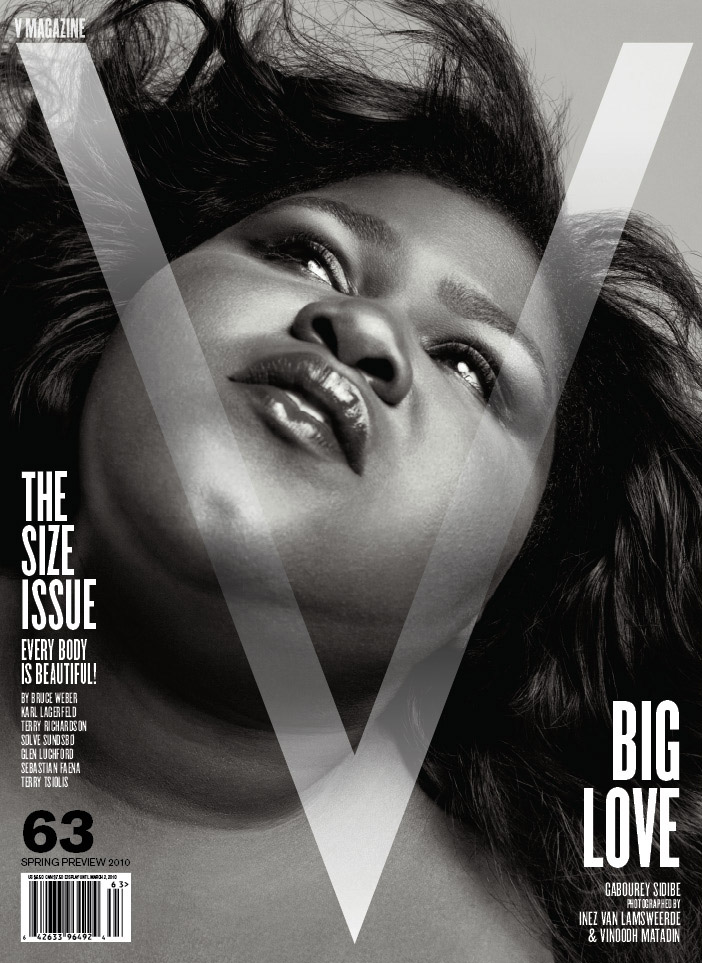Gabby Sidibe and The Debate on Fat Acceptance
As long as I’m covering serious topics like cherry blossoms and libertarians this week, let’s talk about Gabby Sidibe. This post discusses her success and how people have reacted to it. There are two very complicated and loaded sides, I think.
1. She is extremely talented, funny, and self-confident in a way I am definitely not.
2. She is overweight (over 350 lbs) and possibly risking her health.
Am I finally excited to see a woman who is a different body type and race than 90% of Hollywood? Yes, incredibly so, even though, it seems like she was typecast for the role of Precious to begin with.
Daniels , who interviewed 400 girls, said, “I had gone to McDonald’s. I looked everywhere for that girl. And I realized once I spoke to Gabby that if I had hired any of those girls – I would have been exploiting those girls because they were precious.”
I think it would have been a bigger success for her if her breakout role was the lead in a romantic comedy, where stick-thin and unrealistic blonde white women (except for Ginnifer Goodwin and even she lost weight) are the norm. But she was chosen specifically because she was overweight (though, in conjunction with her confidence) ,and that rubs me the wrong way.
Progressive women’s websites are now lauding her up and down. But, as soon as there is ANY discussion about her weight, they say, hands off. My question is, at which point does body acceptance and celebration become dangerous? That we should accept women of all different sizes is a no-brainer, in movies, in real life, and in clothing sizes (as someone who is short for my weight, I can NEVER find pants of the right length.) But my issue is with why those women are different sizes. If they are overweight not as a result of genetics, but because of poor diet choices (obviously I don’t know Gaby’s situation and therefore can’tcompletely), how can they be a role model for girls and why is it ok to accept them? Why is it [<p style="text-align: center;">
 </p>
</p>
As long as I’m covering serious topics like cherry blossoms and libertarians this week, let’s talk about Gabby Sidibe. This post discusses her success and how people have reacted to it. There are two very complicated and loaded sides, I think.
1. She is extremely talented, funny, and self-confident in a way I am definitely not.
2. She is overweight (over 350 lbs) and possibly risking her health.
Am I finally excited to see a woman who is a different body type and race than 90% of Hollywood? Yes, incredibly so, even though, it seems like she was typecast for the role of Precious to begin with.
Daniels , who interviewed 400 girls, said, “I had gone to McDonald’s. I looked everywhere for that girl. And I realized once I spoke to Gabby that if I had hired any of those girls – I would have been exploiting those girls because they were precious.”
I think it would have been a bigger success for her if her breakout role was the lead in a romantic comedy, where stick-thin and unrealistic blonde white women (except for Ginnifer Goodwin and even she lost weight) are the norm. But she was chosen specifically because she was overweight (though, in conjunction with her confidence) ,and that rubs me the wrong way.
Progressive women’s websites are now lauding her up and down. But, as soon as there is ANY discussion about her weight, they say, hands off. My question is, at which point does body acceptance and celebration become dangerous? That we should accept women of all different sizes is a no-brainer, in movies, in real life, and in clothing sizes (as someone who is short for my weight, I can NEVER find pants of the right length.) But my issue is with why those women are different sizes. If they are overweight not as a result of genetics, but because of poor diet choices (obviously I don’t know Gaby’s situation and therefore can’tcompletely), how can they be a role model for girls and why is it ok to accept them? Why is it](http://en.wikipedia.org/wiki/Fat_acceptance_movement) that are obviously unhealthy? Would you tell an anorexic that she was doing the right thing? Obesity is just going in the other direction.
The reason I’m thinking about this issue that I am overweight, and I’m not ok with people telling me it’s ok to be overweight by choice. In general, we shouldn’t all be fitness freaks and eating kale chips, and people should definitely accept my figure, but they shouldn’t vocally approve of the fact that I’ve gained weight. After working extremely hard in college to lose weight in college and maintain a healthy lifestyle, I gained all of it back and more after Mr. B and I got married, because I became lazy and I have awful genetics-whenever I eat anything, it immediately translates onto the scale. Hence the healthier diet and running. I will never, ever, ever be a size 2, or even a 4 or 6. This is easier for me to accept now than in college. And other people should accept it, too. But not that I’ve gained x amount of weight, just because.
However, According to the commenter from Jezebel below, it’s ok that my BMI is now above acceptable levels and that I am now at more risk for things like breast cancer later on in life. The following is from a response to a quote that Kirstie Alley made about wanting to lose weight:
What bothers me most about this quote is that I had the same exact experience and, while I don’t necessarily need people telling me I’ve gained weight, I also should have realized I needed to stop and start eating in moderation. Having a body that gets larger over time is ok. But over how much time? If you are deliberately putting on weight, it’s not ok, and shouldn’t be accepted, and even feminists need to stop jumping all over other people who genuinely are concerned that Gabby is presenting an unhealthy model to young girls.
I guess what it boils down to is this: While we shouldn’t ridicule people who aren’t within BMI range or have health issues due to obesity or those who gain a few pounds, we need to be very careful about how and under what terms we accept weight gain.
Here’s another post covering it from a slightly different angle. Thanks to Hannah for the link.
